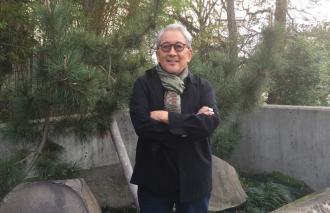The Dramatists Guild Foundation recently honored prolific playwright Philip Kan Gotanda, UC Berkeley’s own professor of playwriting and a creator of one of the largest canons of Asian-American-themed theatre, with the Legacy Playwrights Initiative Award. According to the foundation, the award acknowledges playwrights with “sustained achievement, enduring excellence, and influence on the American theatre.”
For Gotanda, his more than 50-year career of “enduring excellence” has no chance of ceasing yet. As he explained in an interview with The Daily Californian, he still has stories floating inside of him that have been waiting years to be realized.
“You carry around stories in your body,” Gotanda postulated. “They roll around, tumble around and gather flesh as you live your life.”
A look back on Gotanda’s career thus far reveals that some of his most poignant pieces were ones that indeed took years to form. For example, “Ballad of Yachiyo,” a play about his late aunt, was “a six-year journey” that took him on a trip to Kauai and back to gather oral research from his family before eventually “coming forth and writing itself.”
When reflecting on the longevity of his career, Gotanda attributed his success to his continual process of re-examining his art through the lens of emerging social movements.
“I’ve begun to realize that (the universe) doesn’t bend towards justice — it just bends,” Gotanda said. “I’ve reshaped my writing to begin to fit and work with that model.”
As an artist who began his career during the emergence of identity politics in the late 1960s, Gotanda has always been influenced by the friction between dominant and minority culture. He described the social model that he grew up in, in which people of color were united “together on a political front.” Later, he recalled, this world of interconnected minority cultures would be dashed in the Los Angeles riots of 1992.
“(The riots) forced me to rethink again how I saw myself in America,” Gotanda remembered. “I’m always reevaluating myself as an Asian-American and as a citizen of the world … and in relationship to everything that’s happening.”
Similar to the aftermath of the 1992 riots, the pandemic and political turmoil of 2020 caused Gotanda to question the direction of his art.
“If what I have to say is relevant anymore, how do I participate in this discussion? And am I included in it?” he deliberated. “The world that I knew again was changing so much that I didn’t know exactly what it was or how I fit into it.”
While the overall uncertainty of 2020 had a brief stifling effect on Gotanda’s creativity, it wasn’t long before he launched himself into projects — in particular, an opera collaboration titled “Both Eyes Open” that focuses on the imprisonment of 120,000 Japanese-Americans in World War II.
Being separated from the experience of internment camps by only one generation, Gotanda has always been influenced profoundly by the cultural wound left on Japanese-Americans by the internment camps.
“You participate in mainstream society, but you also carry the seeds that come from your own family and your community’s response to the bigger America,” he said. “It fed a lot of what I wrote about and informed how I began to understand what racism was.”
Despite having already explored the topic of internment camps many times in the past, Gotanda has been celebrated for consistently managing to spin the historical event in new ways every time he covers it. This time is no exception.
“It’s a look at the internal journey of a powerful event as opposed to a historical, factual retelling,” he said of the aforementioned opera, which will hopefully premiere at the Presidio Theatre in San Francisco this fall.
Gotanda’s “Both Eyes Open” will feature experimental music with inventive instruments such as the Marimba Lumina, a sort of xylophone that plays a mix of musical notes and miscellaneous sound effects.
“It’s totally new to me,” he added on working with new music instrumentalists such as Paul Dresher. “The big joy of art is to collaborate with people who are more knowledgeable, more artful. … You try to play with people who cover an area that you can’t do as well.”
Besides the opera, Gotanda has a radio play through Berkeley Repertory Theatre underway, as well as a musical collaboration with Shinji Eshima and David Coulter titled “The Man With the Long Coat who Flies Over the City at Night.” Intended to be performed online later this year, the collaboration will discuss themes of loneliness and adversity in several “pods” of short stories.
If the Legacy Playwrights Initiative Award says anything about Philip Kan Gotanda beyond its official description, it’s that Gotanda’s voice is still needed in American theatre. For as long as people are racialized in the United States, new representations of the Asian American experience will be vital, and the next generation of playwrights have much to learn from the legacy of this artistic veteran.
Contact Nurcan Sumbul at nsumbul@dailycal.org.
